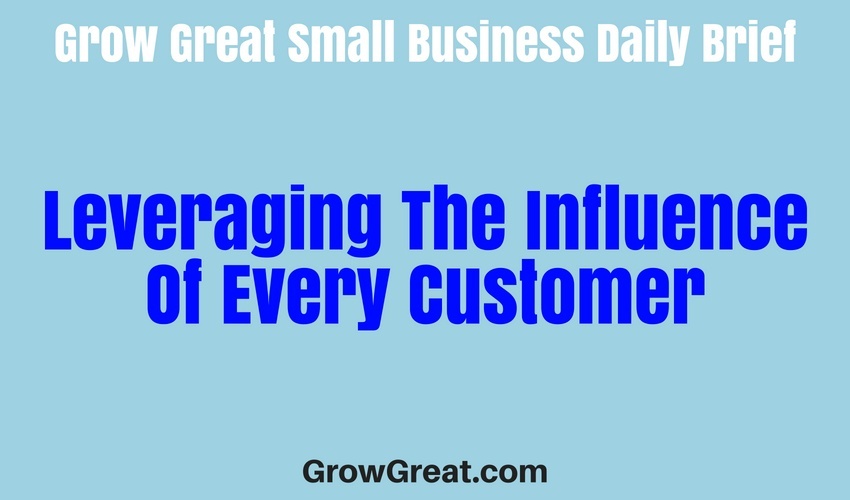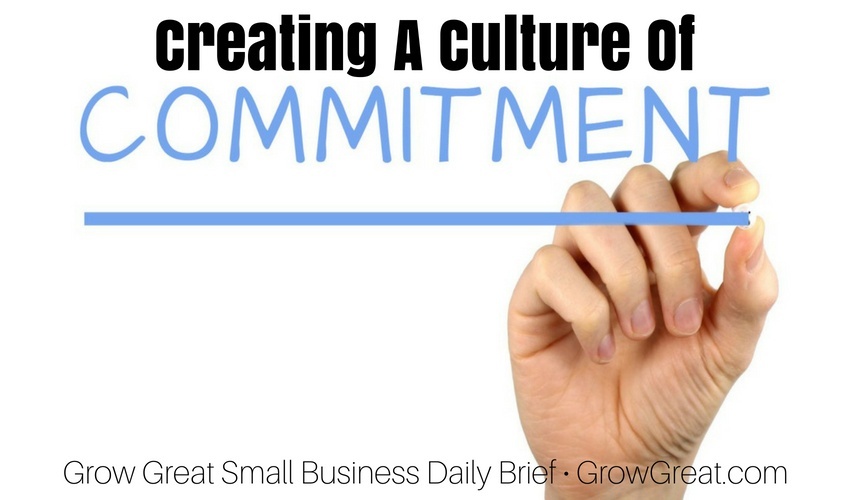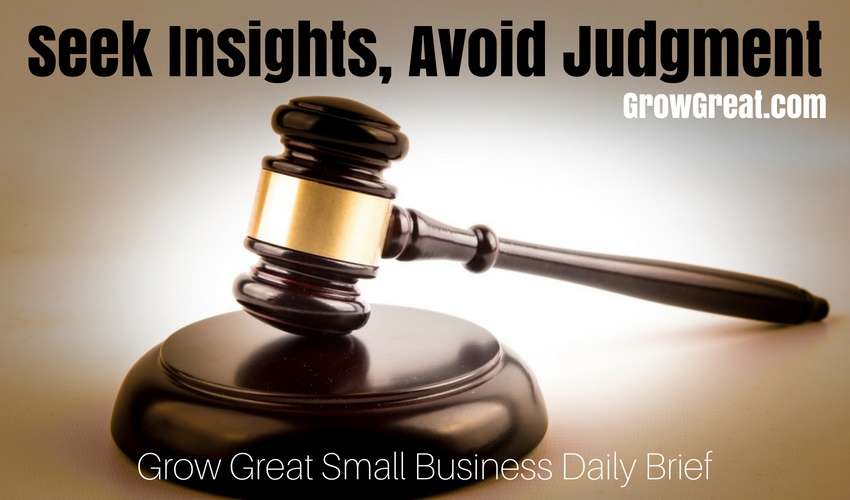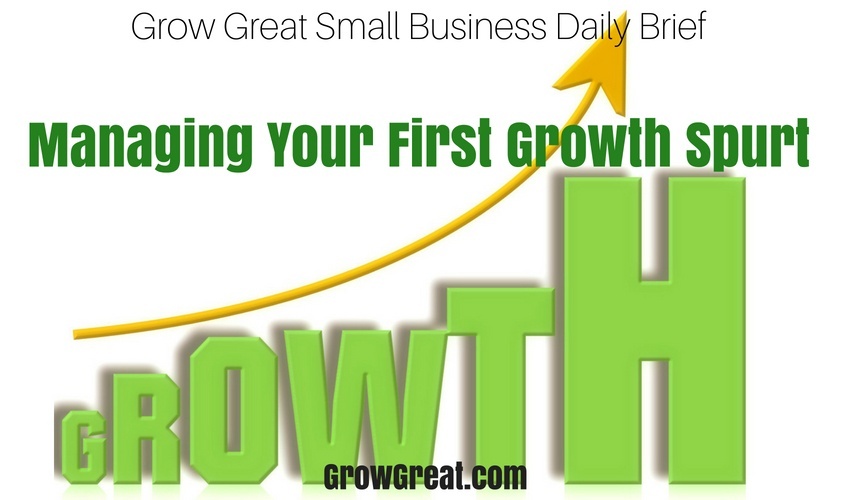Candor With Compassion: Your Communication Is Everything – Grow Great Small Business Daily Brief – June 30, 2018
Podcast: Play in new window | Download (Duration: 7:26 — 8.0MB)
Subscribe: Apple Podcasts | Spotify | Email | RSS | More
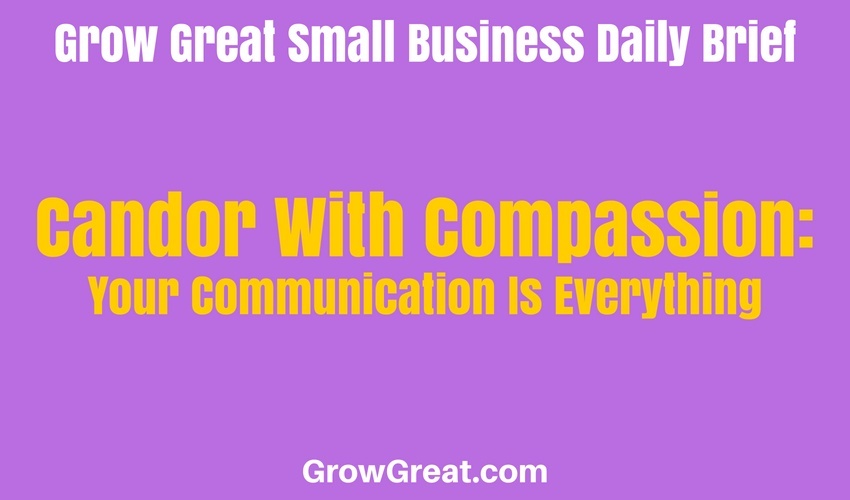
Here’s a secret. Okay, not so much as secret as a little known and little-deployed truth among business owners. Congruency is central to communication. In a word, congruency is about agreement. It’s about things making sense. For your business it’s about your employees finding agreement between what you say and what you do. They’re just like you, trying to make sense of things. Trying to figure out how things fit. It’s what we all do to understand where and how we fit in the world. In this case, the world is the world of your business.
Your employees will craft a story in their head unless you communicate compassionately with candor. Candor can be destructive if it’s not associated with compassion.
Candor is defined as the quality of being open and honest in expression. It’s frankness. And for our purposes, it’s also clarity. It’s not ambiguous, meaning it doesn’t have multiple meanings. Let’s pile one more element on for good measure. Candor is easily understood.
You could incorporate candor like Kramer on Seinfeld. Bluntness with no tact. That’s candor lacking compassion.
Compassion is concern and care for others. It doesn’t mean you tippy-toe around. Or you avoid confronting poor performance or behavior. It just means you do what you do because you’re concerned for the person.
Claude Silver is the Chief Heart Officer for VaynerMedia in New York City. She Tweeted this the other day. Click the image to follow her on Twitter.
That’s the compassion I’m urging you to have as a small to medium-sized business owner. Behave genuinely, openly…and make sure you’re devoted to the truth of those 5 words. Be willing to be the person who says that to your employees. You’ll see some magic happen when you do.
Compassion doesn’t mean you’re soft on performance. This is, after all, about growing great. Cowards and simps aren’t able to grow. Much less to grow great! This is work for people willing to climb and achieve. YOU.
Candid is synonymous with candor. Frankness. Truthfulness. Honesty. Clear, authentic conversation.
You’re failing if after you communicate employees ask, “I wonder what she meant by that?” It means they didn’t understand. And it generates an enormous downside for you, them and the company. Remember, they’re looking to make sense of it all. So as they walk away from listening to you, confused about what you said, they start connecting dots. In their head, they begin crafting a story as they attempt to figure it out and make sense of it. Here’s the deal: they’ll never create a story more positive than the one you could give them. People lean toward thinking the worst, not the best. Your employees will form negative stories if they’re confused.
Another downside is a loss of speed. We’ve all experienced it in our own lives. Whether it was an employer we had when we were kids, learning our first job. Or whether it was a teacher giving us an assignment we weren’t quite sure of. We’ve been asked or told to do something, and be timid to take a step because we didn’t know exactly what we were supposed to be doing. All that halting and hesitation happened because we had no confidence in what we were doing. So we did nothing. Or we did it very slowly, hoping our delay might offer us enough time to figure it out. Your employees do the same thing.
Speed is your friend. You kill your friend when you lack compassionate candor. There goes one of the biggest competitive advantages of your business. That agility and nimbleness is out the window, created largely by your unwillingness or inability to be clear. And to make sure everybody understands.
If I walked around your business and spoke with enough people (and it wouldn’t take that many), I’d quickly find out how much your company values candor. I’d also find out how much compassion is used by you and the rest of your leadership team. You could tell me how you’d like it to be, or how you know it ought to be, but your people know how it really is. Compassionate candor closes that gap and sets you on course to make things be what they should be in order to foster accelerated growth.
Yes, it’s the right thing to do. Yes, it’ll help you avoid being a jerk. Bob Sutton has got a more graphic name for it (I love Sutton’s books and his work). There’s a very practical business reason behind all this, too. The goal is to hit the trifecta of business building: getting new customers, serving existing customers better and to not go crazy in the process! It’s impossible without candor.
One of the chief things I’d love to help more business owners solve is confusion in their culture. People thinking or understanding something different than what you think, or your leadership team thinks. Being on the same page. Rowing in the same direction. Pick whatever cliché you most enjoy, but they all say the same thing. Some people are going in one direction. Others are picking a different direction. You’re blaming them, but it’s your responsibility. You can fix it.
So now you know what you need to hit the ground running to fix come Monday. It’s your job to write the story people will believe in, follow and contribute to make a great success story. Do it properly and they’ll do their part.
Be well. Do good. Grow great!

Subscribe to the podcast
 To subscribe, please use the links below:
To subscribe, please use the links below:
- Click Here to Subscribe via iTunes
- Click Here to Subscribe via RSS (non-iTunes feed)
- Click Here to Subscribe via Stitcher
If you have a chance, please leave me an honest rating and review on iTunes by clicking Review on iTunes. It’ll help the show rank better in iTunes.
Thank you!

